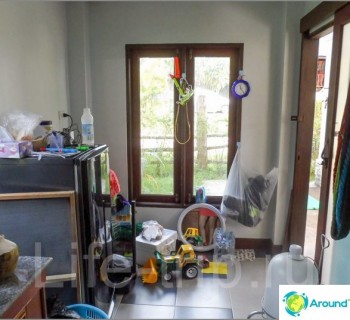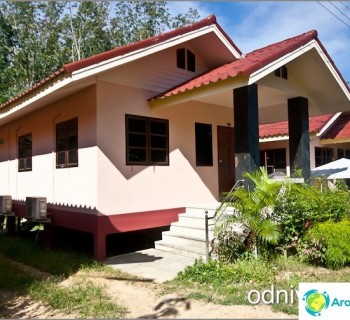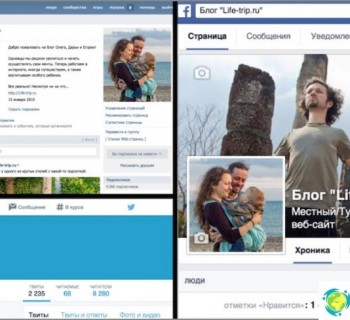Continuing the crisis theme, another guest post from my friend Vitalik, but not at all about emigration. In my article about the fact that wintering in Thailand is not going anywhere in the long term, in the comments we were talking about domestic tourism. I myself would also like it to develop, because I like to go somewhere with a tent, but the conditions are sometimes too wild (few campsites, no parking lots, etc.), and in popular places it is so dirty that it is impossible to plunge into nature. Nevertheless, it is possible and necessary to travel in Russia. How do you like a trip to Yakutia in winter instead of the tropics, at -50 degrees instead of +30?
Part one. Yakutsk.
Last year I bought into Aeroflot's sale and took tickets from Moscow to Yakutsk for the January holidays at a very favorable price. The result was a short, but very informative journey, the impressions of which, at the request of the owners of the resource, I will gladly share here. Ahead there will be a story about Yakutsk, Lena Pillars, Pole of cold, and much more. By the way, air tickets can be monitored on Skyscanner or Aviaseels.
So, the first day. Early arrival in Yakutsk, at 5 am. The airport met (or rather, did not meet) with a complete lack of free taxis. A few minutes later I was lucky and managed to grab the car that arrived at the airport with the first passengers on the return flight. To the question «How many?» the driver replied: «Now double New Year's rate». I had already prepared to hear an astronomical amount, but in fact it turned out to be only 350 rubles. A very cheap taxi in Yakutsk, relative to everything else.
In a guesthouse with an optimistic name «Delight», to my second surprise, they did not charge for early check-in. But the local shepherd dog, sleeping in the yard, clearly did not feel delight at my arrival, rushing at me with an angry bark over the fence of its paddock (the fence, thank God, was of sufficient height). Although you can understand the dog: spending the night in the Yakut frost is unlikely to give anyone complacency.
In general, my plans for the morning sleep were thwarted, and as dawn broke, I went to explore the city..
What can be said about Yakutsk. It is often written on the Internet that Yakutsk is a very dirty city. Indeed, the roads in many places are badly broken and almost absent, and the permafrost does not contribute to good soil drainage, which turns the streets into mush. Plus, for the locals, it seems that there is no problem throwing garbage right next to the road. But this is in the summer. In winter, most of the time, the city is shrouded in a thick frosty fog that settles on all surfaces, chaining them in snow-white frost. Therefore, even an abandoned bag of rubbish looks like such a cute bag of gifts that Santa Claus dropped while driving by on his reindeer. And the roads and sidewalks underfoot look like a clean white sheet, which, together with the complete absence of any odors, creates a feeling of perfect sterility..
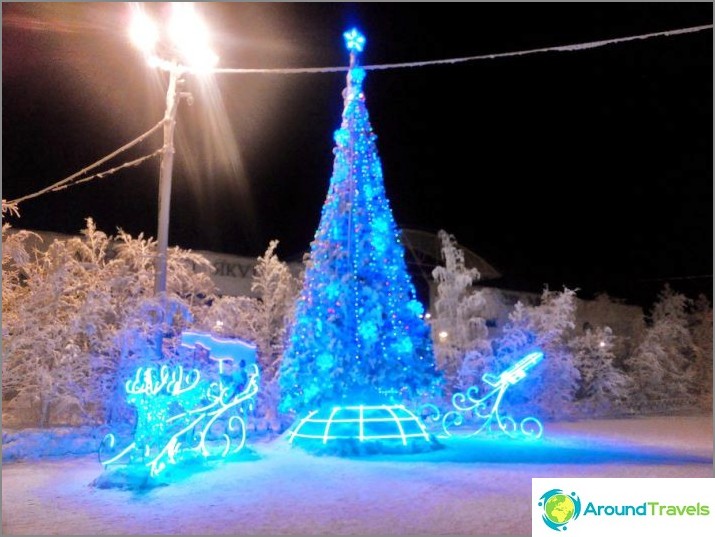
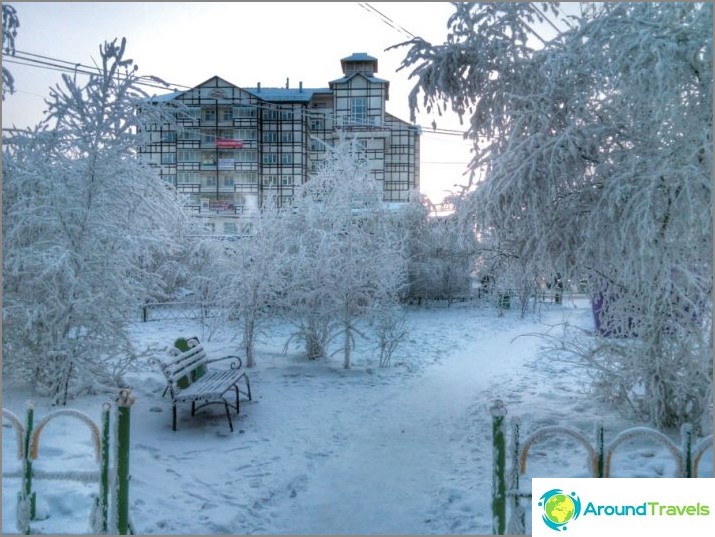
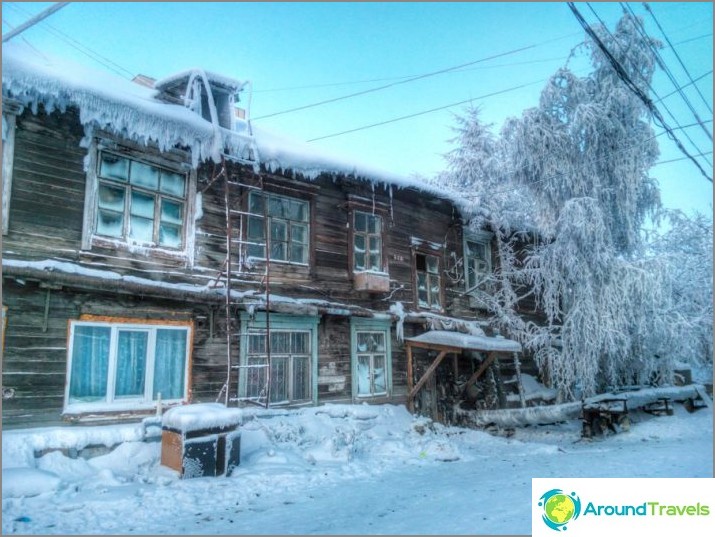
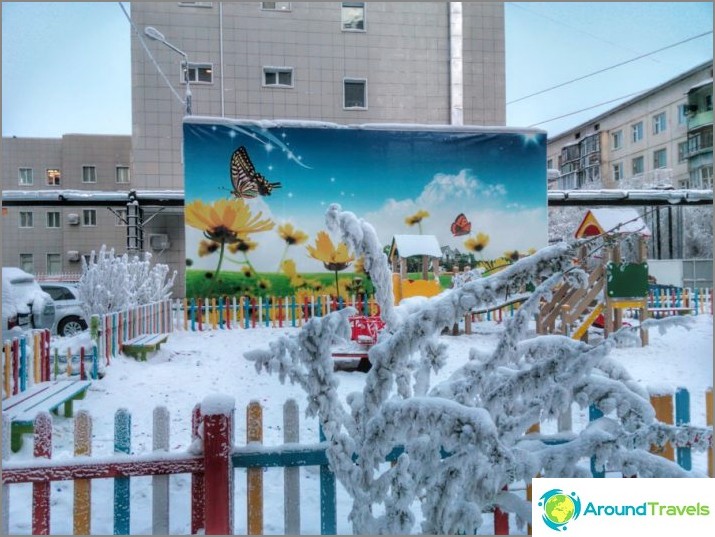
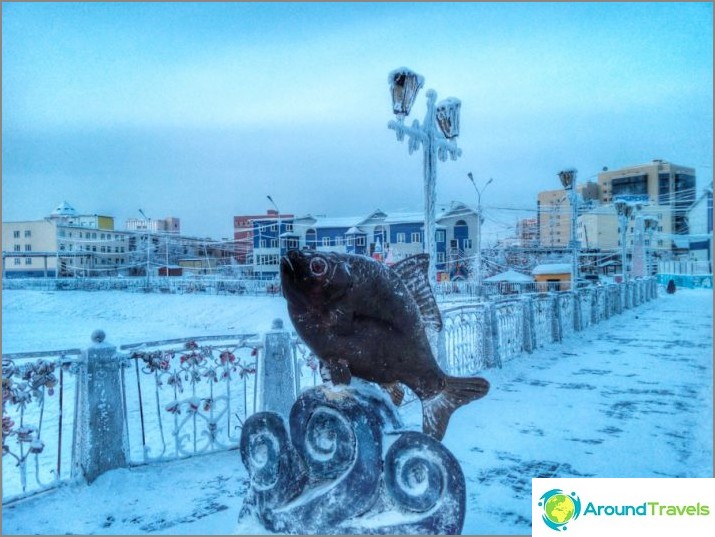
On the first day, I was lucky with the weather, and instead of frosty fog, I found a real January «thaw» - minus 32. The locals seemed to try to get the most out of such a gift from nature, and a real movement reigned in the city center: people were actively shopping, children rode down slides and sleighs with reindeer, and young couples scampered through the streets back and forth ( it was obviously uncomfortable to sit on the benches). What was unpleasantly surprised was the abundance of drunks on the streets, and all turned out to be Yakuts. One of them even tried to sell me his fur hat - so you see his pipes were on fire. It is not for nothing that alcohol in the republic is allowed to be sold only from 14 to 20, and in many villages a strict dry law has been introduced..
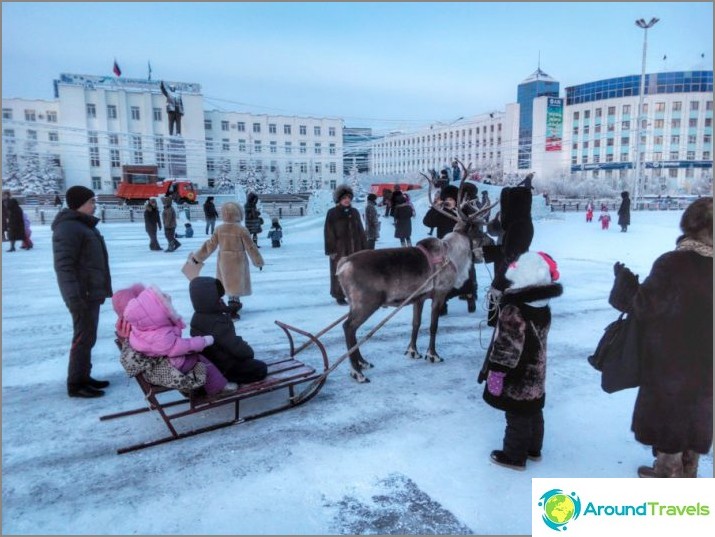
After lunch, visited the ethnographic complex «Chochur Muran» on the outskirts of the city. There you can go sledding, snowmobiling, skiing (there is a kind of lift), as well as get into the Kingdom of permafrost. This is such a deep cave at the foot of the hill, in which they made installations of ice. In addition to ice sculptures and labyrinths, the cave has a hotel room with an ice bed and even an ice bar, in which you can drink vodka from ice glasses with sliced slices. The sensations in the cave are very psychedelic, although its potential is clearly not fully revealed. For example, a full-fledged à la carte bar could be set up. Moreover, the constant temperature in the cave (-10) allows us to consider it as a way to warm up after the street.
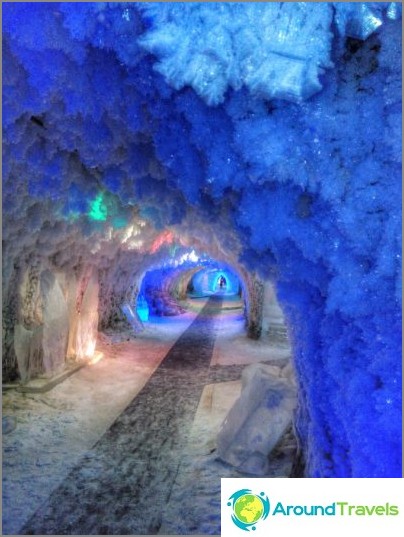
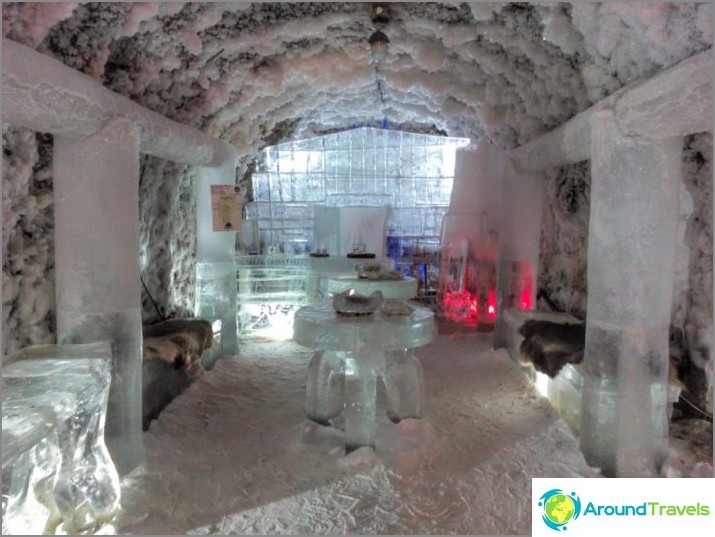
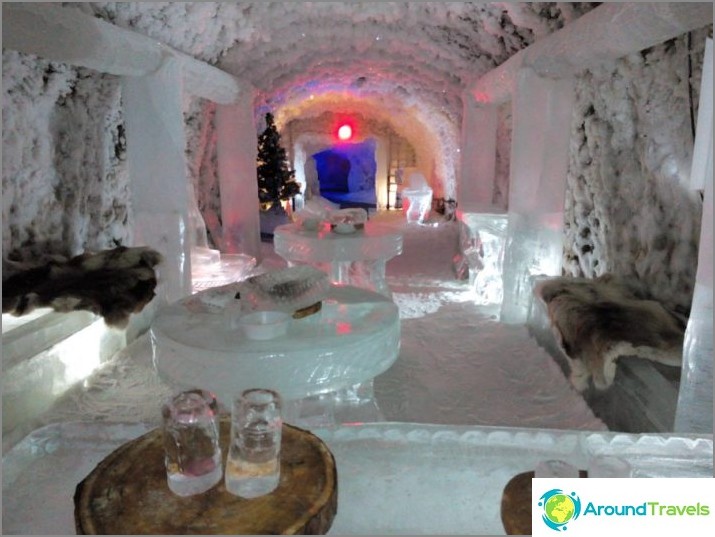
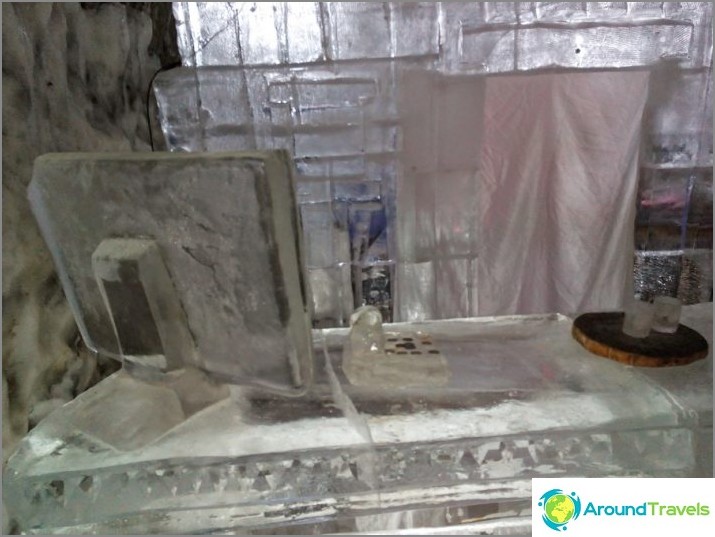
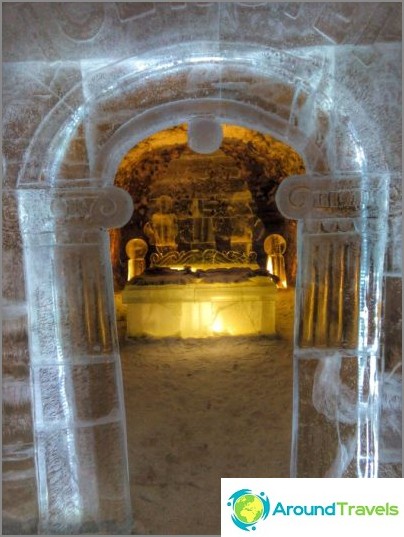
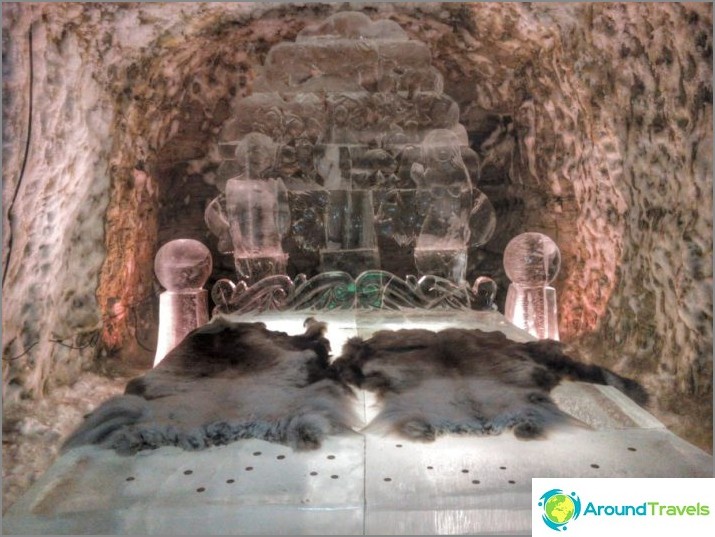
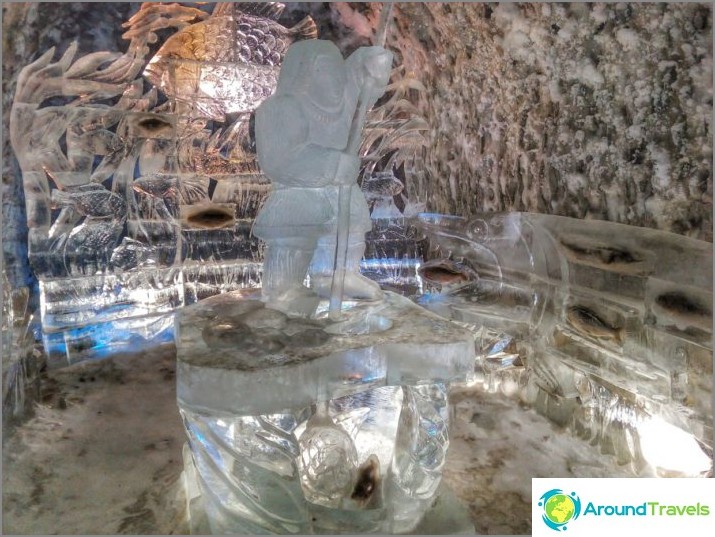
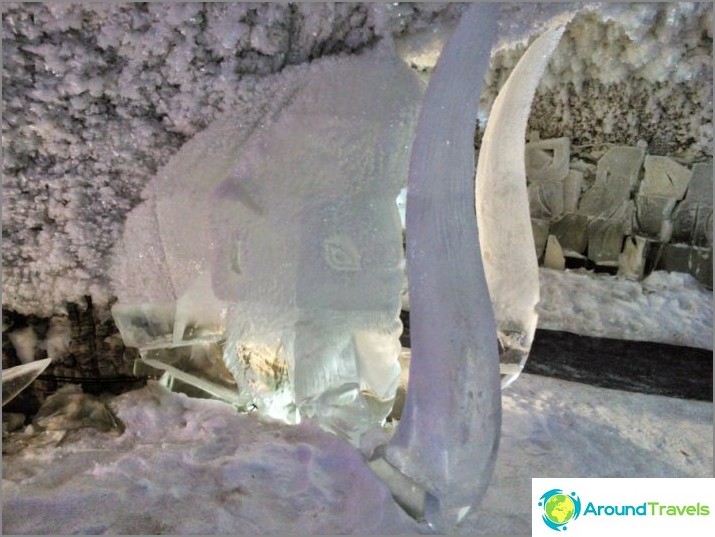
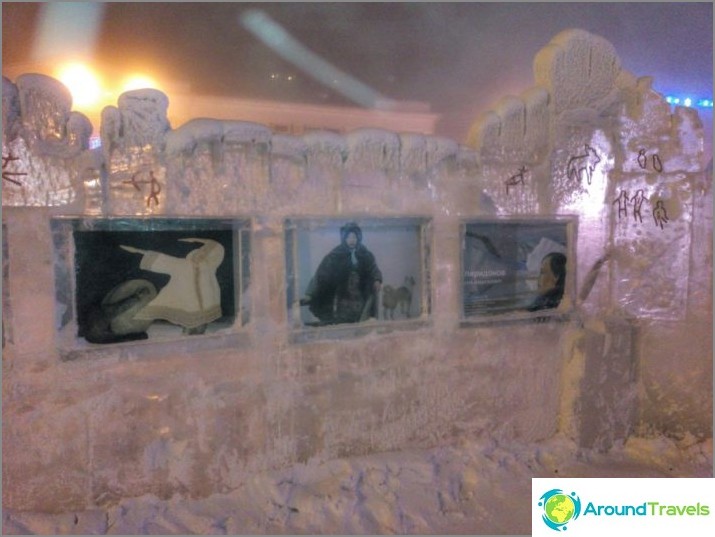
In general, ice is a sacred substance for local people. Every self-respecting institution in the city puts an ice sculpture at the entrance. The river shipping company has a steamer, the Russian Post has a postman on reindeer. Even the favorite Yakut snack - stroganina - must be eaten frozen by all means. Eating thawed stroganina is considered bad manners, almost like cold soup. And a small art gallery was built of ice on one of the central squares - that is, ordinary paintings by local artists are mounted in walls of ice.
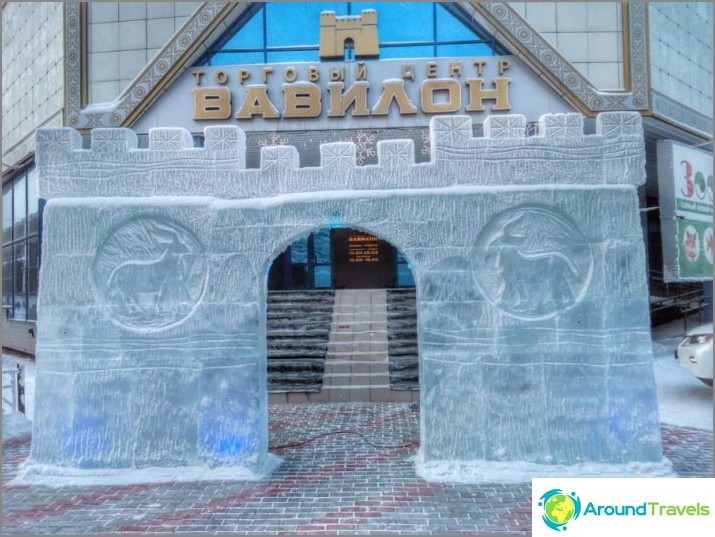
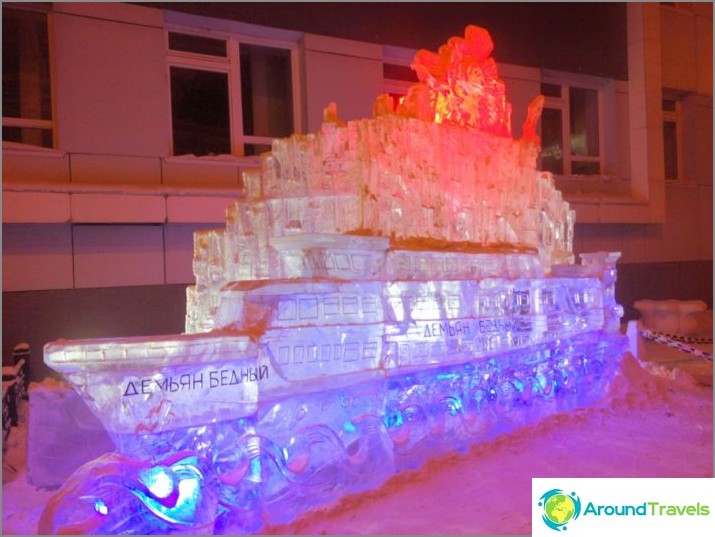
In addition to ice, the Yakuts are very fond of horses. But this love is peculiar, because horses are considered by them exclusively as food. Moreover, it is not horse meat that is valued, like among the Tatars, but a young foal, six months old. Around the pond in the center of the city, there are poles to which the skulls of foals with tails are nailed, apparently symbolizing something. Even at the airport, such an installation is present, but apparently, in order not to shock the European guests, statuettes are used instead of real skulls. The tails, however, are still real.
Slightly less than horses, the Yakuts worship fish. At the entrance to the city market, you are greeted like flower tents, only instead of flowers, fish of different sizes are installed in buckets. They are subjected to instant natural freezing immediately after fishing, so their meat is exceptionally fresh.
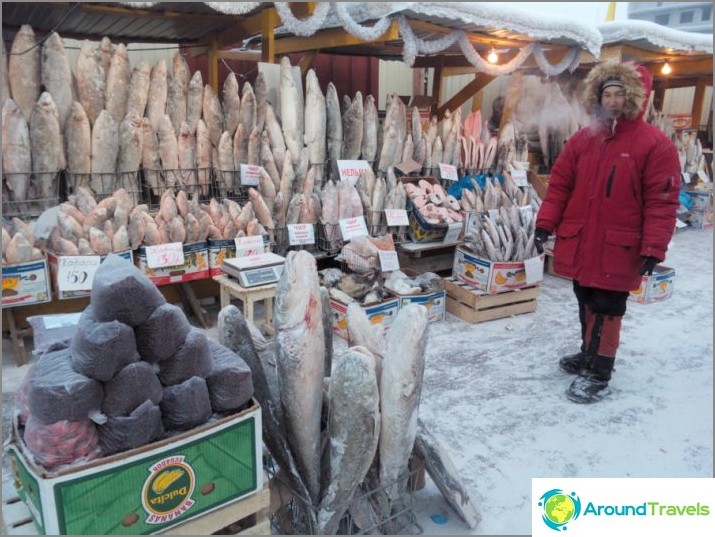
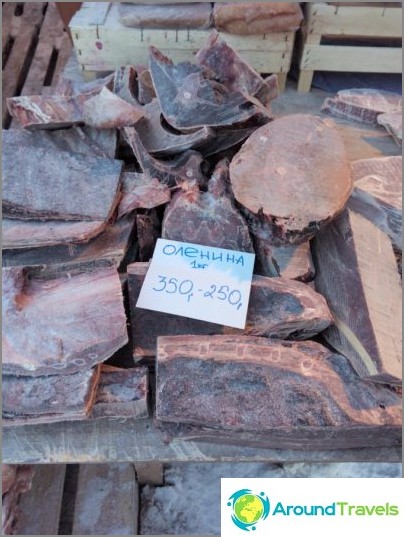
At the end of the evening, the director of our Yakut office, Borya Korolev, gave me a short tour of the city center and told me about the peculiarities of doing local business. On the way, he was repeatedly called, despite the late hours, from corporate clients to the adviser to the president of the republic. I really can't share the details here, because it's a corporate secret.
Part two. Lena Pillars
I stumbled upon the NordStream company by chance at the Yakut forum when I was looking for something to do for a tourist in the vicinity of the city. It turned out that they arrange winter tours from Yakutsk to the Lena Pillars - a natural UNESCO World Heritage Site, by the way. I signed up for a two-day tour, and at the appointed 7 in the morning, a UAZ-loaf mikiobus with a driver and guide Mikhail was waiting for me at the hotel gates. We went to collect the rest of the participants in the city. Contrary to my expectations, the participants were not foreigners and Moscow tourists at all, but local residents, among whom there was only one Russian, and that one with a Yakut girlfriend. By the way, everyone except him was girls..
We had to travel three hundred kilometers to the southwest - first along the highway, then along the ice of the Lena River. On the way, the girls showed me photos from past hikes, and also fed me with their homemade delicacies, of which I remember stewed foal fat and frozen raw foal with onions («Eat faster before it melts», - they said). Oddly enough, all this turned out to be not that mega-tasty, but very nutritious - the body took it with a bang.
On the way, we stopped for the traditional Yakut fun - fireworks. It is done without any kind of fire and is generally extremely environmentally friendly: just pour a mug of hot water from a thermos and sharply pour it out in a fan over your head. In severe frost, the splashes hiss turn into small pieces of ice and ice vapor. From the side it looks very impressive.
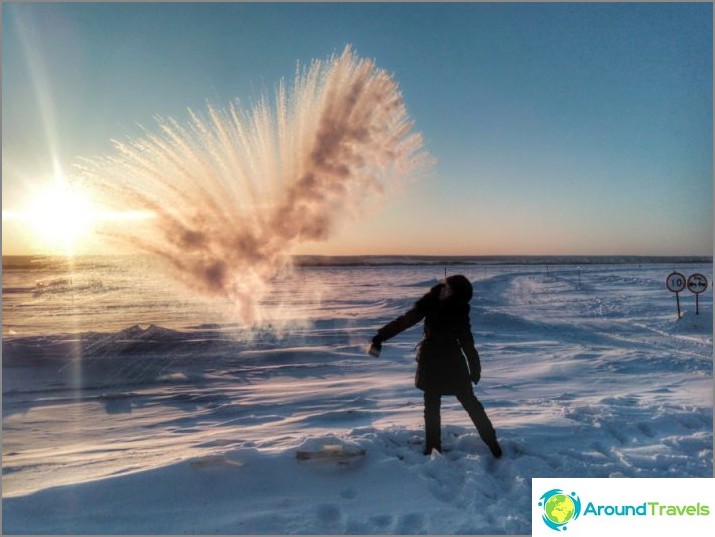
A mandatory ritual, by the way, before going out to Lena - «feed» her, putting some pancakes on the snow and (oh horror!) pouring some vodka or brandy next to it. Such are the superstitious Yakuts.
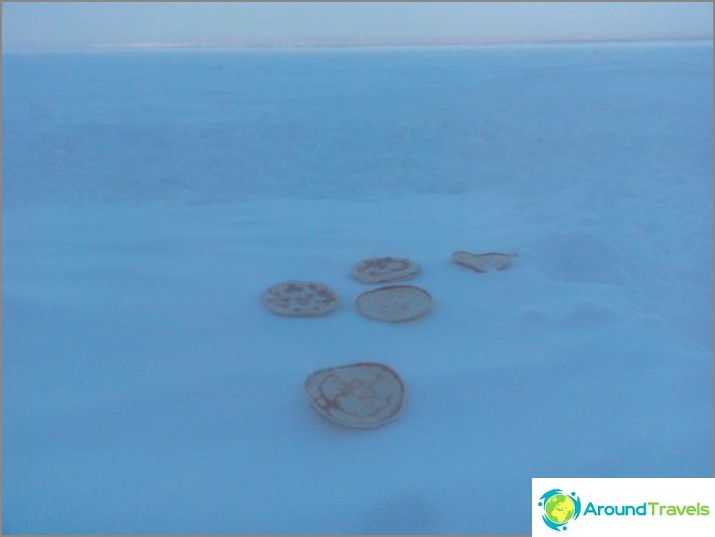
But the main attractions along the way are yellow cliffs with caves and rock paintings from the Stone Age. For local pagans (and according to my feelings they make up the majority of believers here), these drawings have a sacred meaning, something like icons. By the way, if you see rock paintings on the Internet or in literature, most likely it was filmed here, on the right bank of the Lena..
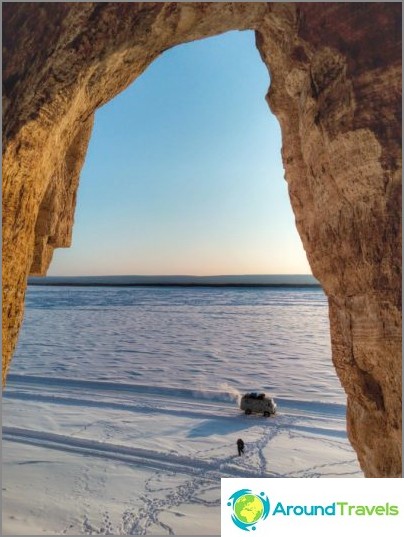
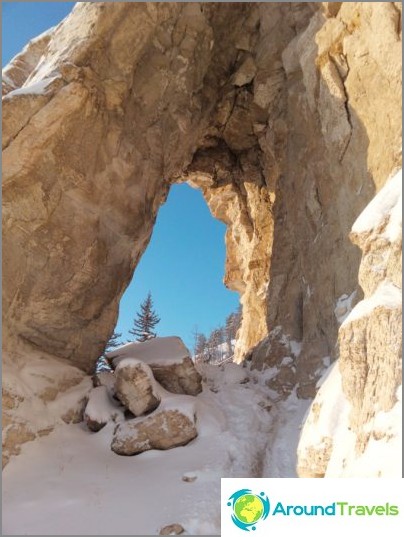
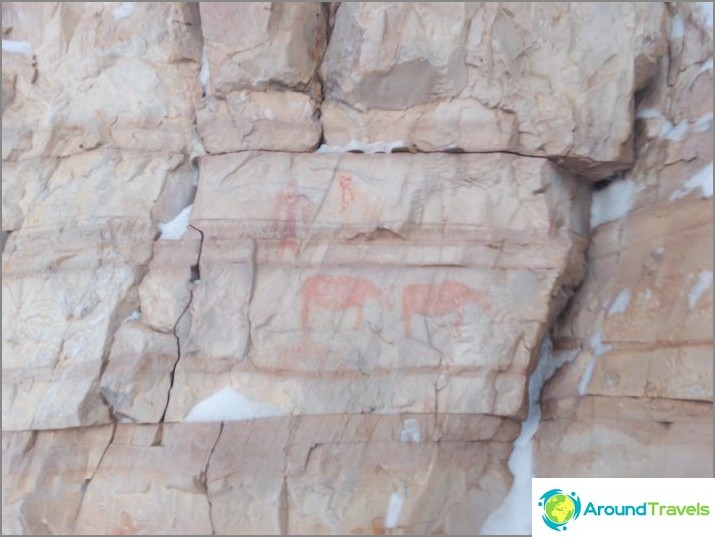
When all the scriptures were studied by us, it began to get dark, and we stopped for the night in a guest house in the village of Tumul. The guest house looked like a simple village hut, inside it looked more like a chum: one large room of 60 meters, where the kitchen and the hallway were marked with small partitions. In the middle there is a small but new stove-stove. It was supposed to sleep on bunks along the walls. The toilet is in the courtyard, and the only source of water is ice blocks chopped by a chainsaw, brought from Lena.
The girls quickly built a small clearing, and then it turned out that each of the members of the expedition took with him a bottle of alcohol - some vodka, some brandy, some champagne. The evening became even more fun, and ended with the fact that everyone went to bed, completely forgetting about the stove.
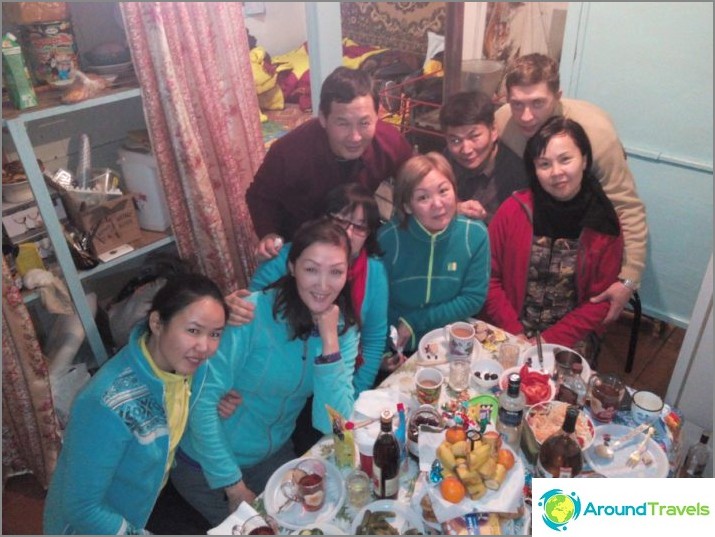
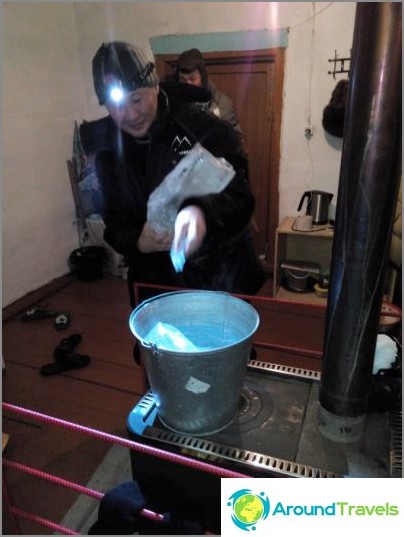
I woke up at about six in the morning feeling that something was wrong. The thermometer on the wall showed a little above zero. Colleagues on the expedition slept peacefully, wrapped in clothes. The stove was barely warm, and the plug on the pipe, designed to keep the heat inside, was not closed. I had to remember the skills of kindling the stove, besides, the means for kindling firewood, which had been stored from Moscow, had to be very handy..
At 11 o'clock in the morning, we had to make a half-hour trip on snowmobiles to Stolby on the other bank of the Lena. The temperature overboard dropped to minus 46, which is more usual here, so the journey, though short, was not easy. Indeed, the snowmobile, maneuvering between the ice hummocks, does not go very quickly, but if it is impossible to dodge the constant wind, the frost penetrates everything not hermetically «packed» body parts. Thanks to the organizers who rented the ski mask - it would have been even more difficult without it. In general, upon arrival at the place, a sip of brandy from a thermos came in handy. You pour it into a mug, and from above it, like milk, is immediately covered with a thin ice foam.
The Stolby themselves made an unusual impression, although I expected a little more. A huge, multi-kilometer chain of columns extending into the fog. It seems that all this was built by someone with an incomprehensible purpose (for some reason I remembered Olympic Park in Sochi). The pillars are located so that they cover the low northern sun, which almost does not get here, and at the foot it is always gloomy and colder than in the surrounding area.
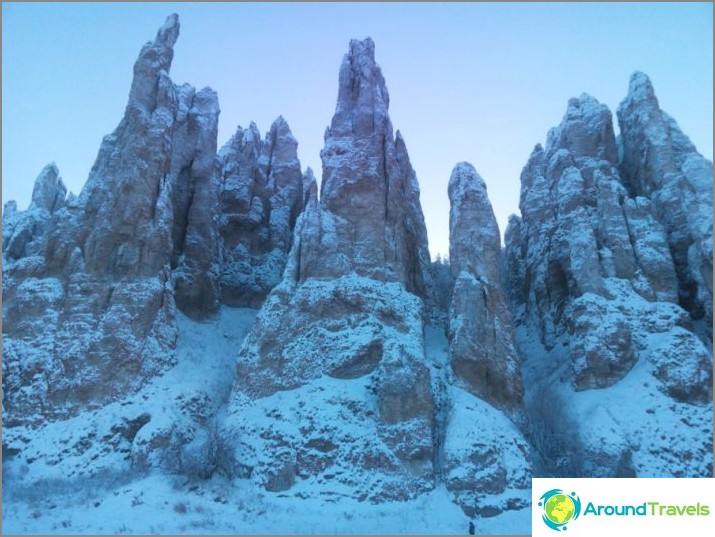
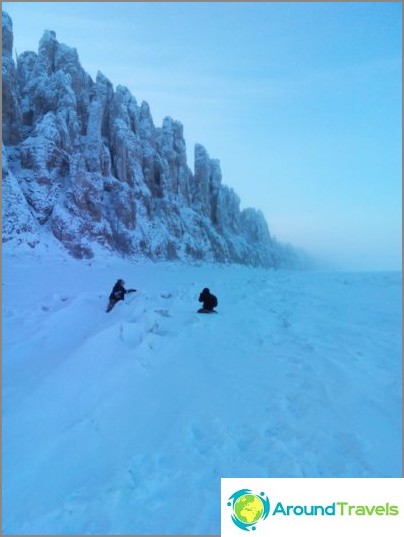
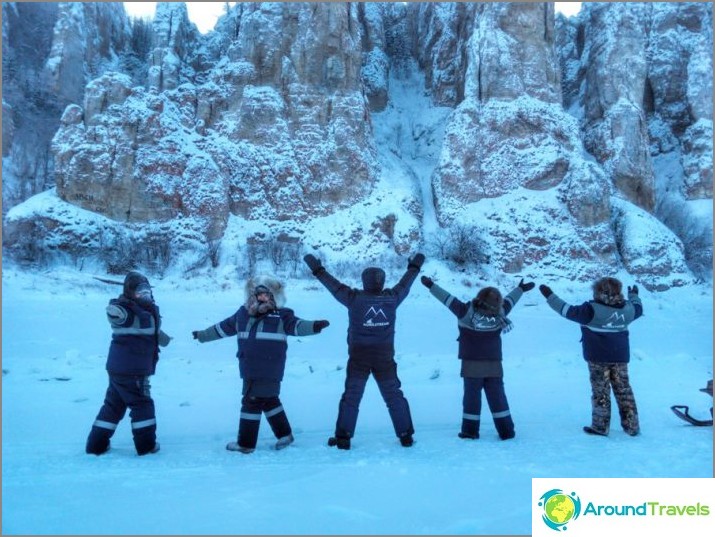
Having climbed a little on the poles (and in felt boots it is not easy on snow-covered rocks), I decided to ride a snowmobile while driving. The owner, the local hunter grandfather, did not mind, and I happily saw the division on the speedometer «180», gassed to full. Then the owner shouted: «Slow down!» It turns out that at such temperatures, equipment cannot be heavily loaded, otherwise it may fail. That this is a harsh reality, I still had to be convinced in practice, but this time it cost.
Returning to the village, after a short lunch we went home, and in the evening arrived in Yakutsk. The next day I had a trip to the most severe place on the planet where people live - Oymyakon, but more on that in next post.
P.S. Vitalik does not blog, so here is a link to his Facebook account.
